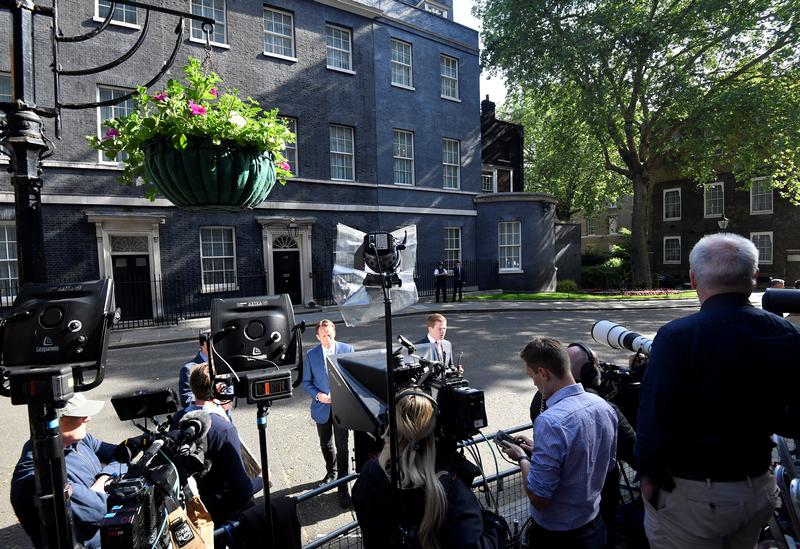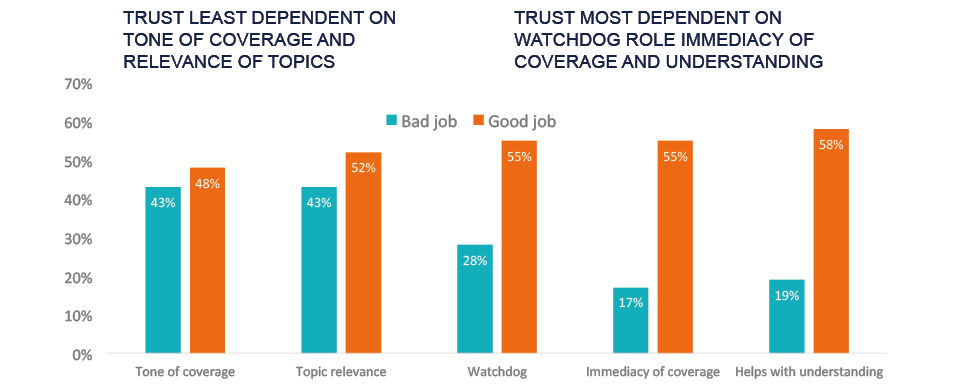
Members of the media wait outside of Downing Street as British Prime Minister Theresa May is expected to make a statement, in London, Britain, May 24, 2019. REUTERS/Toby Melville
This forward looking essay by Richard Fletcher supplements the Journalism, Media and Technology Trends and Predictions 2020 report. See menu for other such essays.
Journalists in 2020 will have to confront the possibility that trust in the news media will shrink in the coming years. This prediction does not reflect my own assessment of how the news media is currently performing, nor my views about the broader societal context within which journalism operates. Rather, it is simply based on the observation that trust in the news has fallen in most countries since 2015, and within our community there’s no real consensus on why this has happened or what can be done about it. As such, it is difficult to imagine that trend being reversed. Thus, while the majority of the digital leaders surveyed are confident about their company’s future prospects faced with technological and business disruptions (See page 9), the social and political disruptions of eroding public trust remains a challenge for many news media.
Eroding Trust
According to data from the Reuters Institute Digital News Report survey,1 national levels of trust in the news media have fallen by an average of five percentage points across 18 countries since 2015. Of course, if we take a closer look at the data things get more complicated. In 10 of the 18 countries where we have data going back five years, trust has indeed declined, but in the other eight it has either increased or stayed the same (see chart). Furthermore, even in those countries where trust has fallen, the decline in some ways looks smaller than we might have inferred from the crisis narrative that permeates many discussions.
Proportion that trust most news most of the time (2015–2019)
Selected countries
That being said, small year-on-year declines have in some cases compounded to produce sizeable drops of around ten percentage points since 2015. In Germany, the proportion that trust most news most of the time has fallen from 60% in 2015 to 47% in 2019. In Finland, the figure has dropped from 68% to 59%, and in the UK there has been a fall from 51% to 40%. The chart also reveals that those countries that have experienced declines (indicated with red lines) are typically those that started off with relatively high levels of trust. Of the 11 countries where trust was over 40% in 2015, eight have seen statistically significant declines in trust, with the figures stable in the remaining three. The only countries that have seen an increase in the last five years are those that had relatively low levels of trust to begin with. When it comes to public trust in the news media, it seems things tend to get worse before they start to get better.
What drives the erosion of trust? Can anything be done to reverse the downward trends? We should keep in mind that trust in the news media is not entirely in the hands of journalists and news organisations. Many people do not have strong opinions about the news media, and other cross-national studies have shown that trust in the news media is increasingly tied to levels of trust in politics.2 If trust in political institutions falls, then trust in the news media is dragged down with it. And if the political situation becomes more polarised, even the best news coverage can come to be seen as biased by large sections of the population.3 People’s perception of journalism and the news media is thus deeply influenced by their perception of other institutions, and by cues provided by politicians and other elites – politicians and elites who in some countries increasingly aggressively and explicitly attack independent news media and question journalists’ integrity and motives.
What can be done to increase trust? In terms of what journalism and news organisations can do, one starting point might be to look at what people with different levels of trust in the news media think it currently does well (and, conversely, what they think it does poorly). As I have written previously,4 people who think that the news media does a bad job of keeping them updated with current events, fails to help them properly understand the news, or is unable to monitor and scrutinise the powerful, are much less likely to say they trust the news (see the next chart). Whether or not the stories chosen by the news media feel personally relevant to people, and whether or not the news media adopts a positive or negative tone, seems to be less important.
Proportion that trusts the news by attitudes towards the news (2019)

Q15_2019_1/2/3/4/5. Please indicate your level of agreement with the following statements: The news media monitor and scrutinise powerful people and businesses/The topics chosen by the news media do not feel relevant to me/The news media often take too negative view of events/The news media keep me up to date with what’s going on/The news media help me understand the news of the day. Q6_2016_1. Please indicate your level of agreement with the following statements: I think you can trust most news most of the time. Base: Bad/Good: Tone of coverage = 12,295/29,774, Topic relevance = 21,950/18,876, Watchdog = 31,465/14,479, Immediacy of coverage = 46,881/8699, Helps with understanding = 38,786/11,061.
What I think this shows is that trust is not rooted in different ideas about what the news should be, but in how well it meets widely accepted goals. This is both an opportunity and a challenge for journalism. For the most part, people accept that some topics are inherently newsworthy and some are not, and as a result, a lot of coverage tends to be negative. But they struggle to trust news media they believe are performing poorly when it comes to reporting in a timely manner, helping them understand the world around them, and holding power to account. In other words, people with low trust in the news media don’t want it to be fundamentally different – they just want it to be better.
Richard Fletcher is a Senior Research Fellow at the Reuters Institute for the Study of Journalism and leads the Institute’s research team. His primary research interests are global trends in digital news consumption, comparative media research, the use of social media by journalists and news organisations, and more broadly, the relationship between technology and journalism. He is lead researcher and co-author of the main Digital News Report – the world’s largest annual survey of global news consumption.
1 https://www.digitalnewsreport.org/
2 https://journals.sagepub.com/doi/full/10.1177/1940161217740695
3 https://reutersinstitute.politics.ox.ac.uk/risj-review/bias-bullshit-and-lies-audience-perspectives-low-trust-media
4 https://www.digitalnewsreport.org/survey/2019/what-do-people-think-about-the-news-media/
